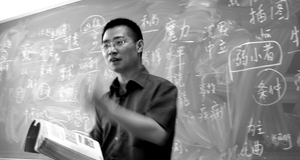From Cornell International Affairs Review VOL. 1 NO. 2Global Outreach Plan for Colleges
By
Cornell International Affairs Review 2008, Vol. 1 No. 2 | pg. 1/1 Dr. David J. Skorton, president of Cornell University, first introduced the idea of a new initiative emphasizing the international development of human capacity through the dissemination of university research, teaching and outreach at his first commencement address to the graduating class of 2007. Since then, the idea has inspired several conversations between Dr. Skorton and other academic leaders and institutions looking to effect change, including the U.S. Agency for International Development (USAID) and the National Association of State Universities and Land-Grant Colleges. He is also participating in the upcoming Higher Education Summit for Global Development with Secretary of State Condoleezza Rice, Secretary of Education Margaret Spellings and Administrator for USAID Henrietta Fore, the goal of which is to develop strategies to establish new and enduring higher education relationships for international development. These conversations help to galvanize the issue of eradicating international socioeconomic inequalities. Dr. Skorton recognizes and appreciates Cornell International Affairs Review’s “international, interdisciplinary and intergenerational approach to world affairs.” With his permission, the following article, which was first published in the September 21, 2007 issue of The Chronicle of Higher Education, is reprinted to continue the critical discourse on the development of human capacity around the world. Speaking at a Harvard University commencement 60 years ago, Secretary of State George C. Marshall proposed a massive program of aid and redevelopment — since known as the Marshall Plan — to bring a war-ravaged Europe back to economic health, political stability, and peace. Today we need a new such plan, with university teaching, research, and outreach at its center, to help resolve the socioeconomic inequalities that threaten our country and the world. At a time when other nations are challenging the United States economically as well as on religious, moral, and ideological grounds, we should enlist our colleges and universities to fulfill their potential as one of our most effective and credible diplomatic assets. The World Bank has estimated that more than 2 billion people worldwide currently live on less than $2 per day. More than 1 billion people lack access to good water sources, and 42 percent of the world’s population, or 2.6 billion people, don’t have access to proper sanitation, according to the World Health Organization. About 146 million children in the developing world are malnourished, Unicef data show, and more than 10 million children under the age of 5 die each year, many from causes that would be preventable with better nutrition and access to basic health care. Such dire situations represent a humanitarian crisis of the first order and — as our world is becoming smaller and more interconnected — a threat to stability, intercultural understanding, and peace. In his speech at Harvard, Marshall stated: “It is logical that the United States should do whatever it is able to do to assist in the return of normal economic health in the world, without which there can be no political stability and no assured peace. Our policy is directed not against any country or doctrine but against hunger, poverty, desperation, and chaos.” The United States offered about $140-billion in today’s dollars to support Marshall’s proposal, but only if Europeans drew up a rational plan for using the aid and agreed to act cooperatively. The resulting Marshall Plan was shrewd and visionary and, at the same time, informed by enlightened American self-interest and a capacious national sense of “self.” The results were unprecedented, and we continue to benefit from its wisdom to this day. Since 1947 there have been numerous calls for new Marshall Plans to deal with needs throughout the world — in Africa, Central Asia, Eastern Europe, and elsewhere. Much of the work and resources must come from governments through traditional vehicles, like the U.S. Agency for International Development, as well as promising new ones, like the Millennium Challenge Corporation, a U.S. government corporation established in 2004 to provide assistance to countries in order to achieve specific development objectives. But colleges and universities can and should play a more central role in helping countries that are struggling to meet the needs of their citizens by improving local education, research, and problem-solving skills. Indeed, the development of human capacity is not only one of the most effective ways to ameliorate global inequalities, but it is also a prerequisite for any enduring improvement of the standard of living at the local level, where it matters most. No single college or university, acting alone, can achieve what will be needed in tomorrow’s world. Together, however, the nation’s great research institutions — public and private, land-grant and Ivy League, working with the U.S. government, businesses, foundations, nongovernmental organizations, and, most important, our academic colleagues overseas — can offer a more focused application of our own resources to reach out, materially and directly, to assist and improve the quality of life. American colleges and universities are a beacon of hope and opportunity throughout the world because of the transformative power of our education, best captured by the old proverb: Give a child a fish, and she will eat for a day. Teach a child to fish, and she will feed herself, and perhaps also her family and community, for a lifetime. The reality is that there is not enough capacity worldwide to satisfy the spiraling demand for higher education, which is fueled by the needs of an exploding global middle class — particularly in China and India — and the collapse of Africa’s higher-education infrastructure. That leaves a growing number of capable students with no options to pursue their education. Simply put, we cannot handle tomorrow’s students and the demands for advanced skills with the resources that exist today. In the United States, we can tap the strengths of higher education to develop a new kind of plan to deal with this challenge. First, the many research and land-grant colleges and universities should coordinate their current efforts in capacity building in the developing world, perhaps through intercampus agreements or professional associations like the National Association of State Universities and Land-Grant Colleges. Second, our colleges and universities should collaborate to develop a strategic research and education agenda that complements issues of concern to similarly oriented NGO’s, corporations and foundations, and our counterparts overseas, in areas such as nutrition, global health, sustainable technologies, and conflict resolution. Following the introduction of President Harry S. Truman’s Point Four program in 1949, which extended the Marshall Plan to the world’s developing countries, Michigan State University’s president, John A. Hannah, informed the White House that institutions in the Association of Land-Grant Colleges and Universities (now called the National Association of State Universities and Land-Grant Colleges) were willing to contribute to the effort. Within three years, eight of those universities were involved in technical-assistance programs overseas, and by 1964, more than 150 such programs were under way. A similarly focused effort by universities today might be directed toward NGO’s or private-sector entities that support work in important fields. Ultimately, we should develop a comprehensive strategy with global reach to guide and assist governmental efforts of the United States and other nations. We should redouble our efforts to make the White House and Congress aware of the role that universities can play in international development and why public support for university-led capacity building overseas is in the national interest. Presidents, provosts, government-relations staff members, faculty members, and trustees can all serve as effective advocates for such efforts in the public-policy arena. The stakes are as high today as they were 60 years ago — and perhaps even higher; the explosive international situation must be redressed for the benefit of the worldwide community. Echoing President Truman when he explained his support of the Marshall Plan, we must undertake this effort “because it is right” and “because it is necessary to be done, if we are going to survive ourselves." Suggested Reading from Inquiries Journal
Inquiries Journal provides undergraduate and graduate students around the world a platform for the wide dissemination of academic work over a range of core disciplines. Representing the work of students from hundreds of institutions around the globe, Inquiries Journal's large database of academic articles is completely free. Learn more | Blog | Submit Latest in Education |




















